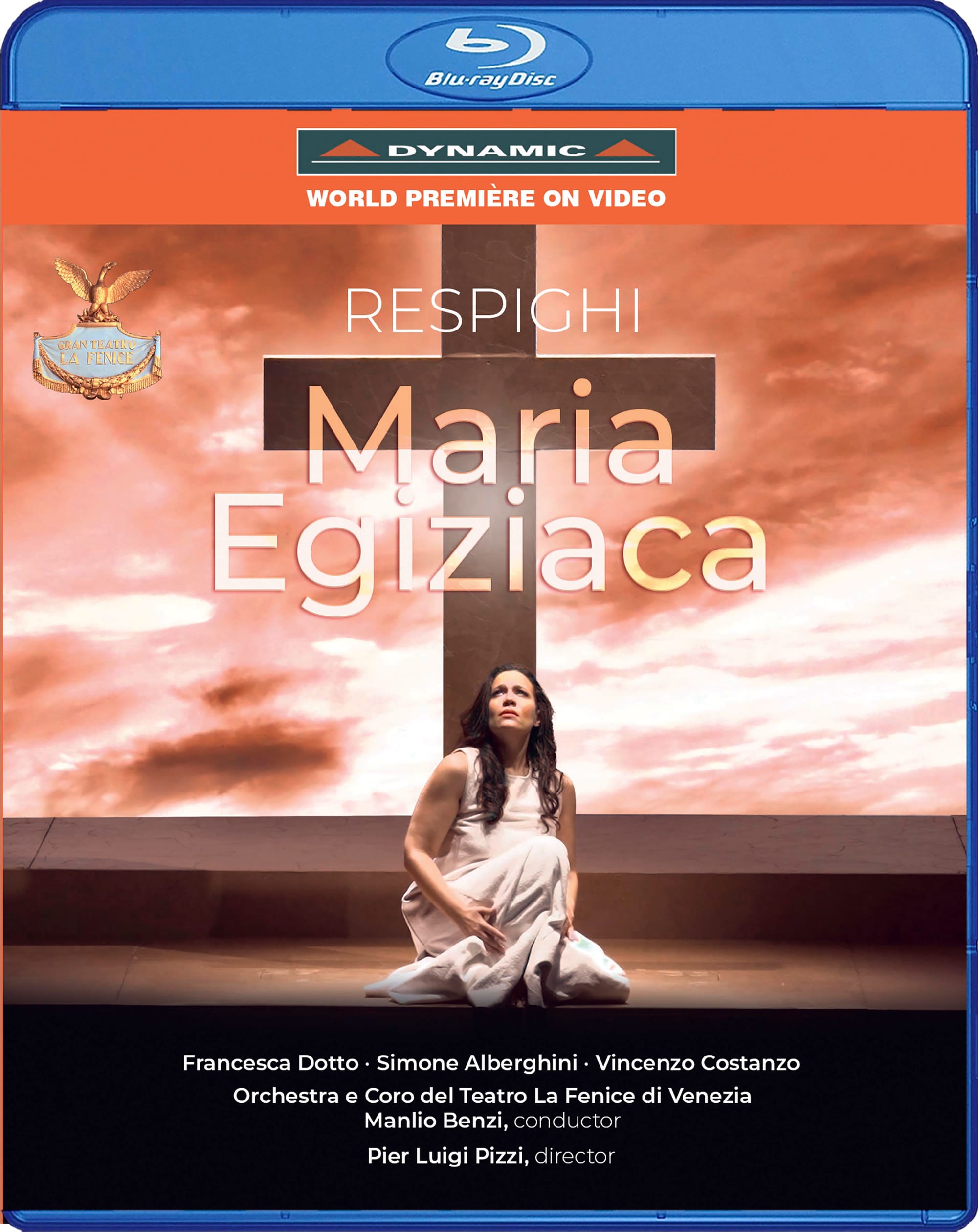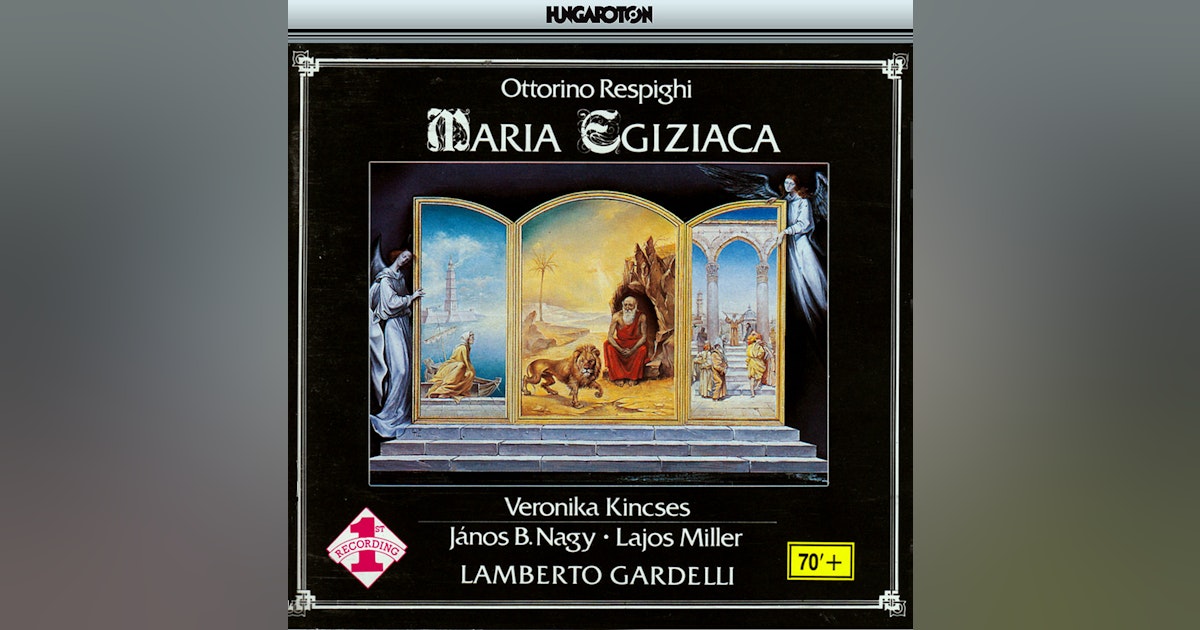
Ottorino Respighi’s ‘mystery in three episodes’, Maria Egiziaca (Saint Mary of Egypt) started out as a concert triptych. Some have suggested its dramatic/symphonic slant puts it midway between oratorio and opera, but stagings are fairly common; its premiere in 1932 in New York was in secular, concert format. The conductor was to have bene one Arturo Toscanini but apparently he had a sore elbow (!) and so it was conducted by the composer.
Little-known though it may b, some great sopranos have taken on the principal role of Maria: Maria Cignna in Roma, and , relevant to this performance via locale, Maia Caniglia in Venice.
Maria’s tale is one of prostitution to sainthood; instead of acts we get “Episodes”: thee, like a religious triptych.The libretto by Claudio Guastalla, is excellent. He drew his libretto/poem from an early Christian legend, working in the main from The Lives of Holy Fathers by Fra Domenico Cavalca of Pisa. Born in Egypt,, Mary spent 17 years in Alexandria as a prostitute, but one who became desperate to escape her profession. She uses her feminine whiles to attain a passage on a boat to the Holy Land. Upon arrival in Jerusalem, the other pilgrims enter the Church of the Holy Sepulchre, but a mysterious power prevents her from entering. Finally an Angel appears (in some sources this is Mary, mother of Jesus), and reveals to her the nature of her sins, inviting in repentance and conversion to God. She is baptized and, in surely a parallel to Jesus, spends forty years in the desert. There, she is found by Abbot Zozimus, her nakedness covered only by her hair. Zozimus brings her the Eucharist, and she dies. The abbott attempts to dig her grave with a small piece of wood, but a lion appears, miraculously, and digs the grave for him.
Respighi is clearly on the ascendent. Recently, the Guildhall School of Music and Drama performed Maria Egiziaca alongside La bella dormente nel bosco (The Sleeping Beauty), an evening covered by myself for Opera Now here. The DVD/Bluray of Sleeping Beauty from Cagliari was covered on Classical Explorer here. And, of course, there was Alessandro Crudele’s superb orchestral Respighi disc with the London Philharmonic on Linn records.
That said, there have been few performances in recent years of Respighi opera though: apart from this Fenice and that Guildhall performance, I am only aware of a performance in 2013 in Wuppertal, Germany, where it was staged – but in a church, which seems appropriate, Wuppertal’s Immanuelskirche (which doubles as a “Kulturzentrum”); Dorothea Brandt was Maria. We also need performances of other Respighi operas: Lucrezia has turned up on disc via Batislava and Germany (Assisi Records); La Flamma, probably his most famous, is available with Gardelli at the helm; and La campana sommersa (The Sunken Bell) is available on Bluray/DVD from Cagliari (as far as I can see that 2015 performance was the first since Montpelier in 2003. Then there is Lucrezia, which appeared in what sounds like the most fascinating pairing, with Orff’s Der Mond, in Munich earlier this year (I would have loved to have seen that!).
Here is the promotional video for this production from Venice’s La Fenice (recorded on March 10 this year):
Using video effectively (in the first scene, a watery scene with obelisk is shown with Maria reaching out to the monument, for example), Pier Luigi Pizzi’s production sets up, alongside Respoghi’s music, a heightened sense of atmosphere.It complements the extended orchestral interludes brilliantly, oo.
Vincenzo Costanzo is the sailor who opens the opera, sparsely accompanied (at one point only by a sinewy oboe melody). Th production leaves no doubt as to Maria’s sexuality in her interactions with this sailor. She then meets a Pilgrim (Simone Aberghini, in terrific voice). But it is Francesca Dotto, as Maria, who is the powerhouse of the performance, owning the stage, palpably enabling us to be part of Maria’s transformative experience.
Aft the sexual antics of the first scene (it is sex that enables Maria to travel with the seamen), the second episode makes us to the fast of the Elevation of the Cross. Maia arrives, accompanied by a Blind Woman (who later sings as Voice of an Angel), here the magnificent Ilaria Vanacore (other name to remember – if she can make her mark despite Dotto – who has a huge stage presence – she will go far).
Dotto needs a Pilgrim who can match he vocally and dramatically, and Aberghini certainly fits the bill. His faith in the Christina God is clearly unshakeable, a God that all “stick” Maria for her “transgressions”. he second episode hold Maria’s conversion – she becomes was of her “sins”. The conductor is right, in an interview reproduced in teh booklet, to point to each episode having its own colour. Maria’s transformation is itself transfixing through Dotto’s interpretation. It is intensely powerful, powered by Respighi’s day harmonies as if we eavesdrop on the deepest levels of Maria’s psyche. Dotta’s voice is strong, emotional, entirely believable at her vision fo an angel (which we see, also, projected behind her followed by an image of what look like doves – traditionally, symbol of the Holy Spirit, but referred to in the text as “white hawks”). As in the first episode, Gotta dominates, yet here the effect is totally different, the move to, and embrace of, the cross massively touching (“O salutary on” she sings, tenderly); she perhaps unsurprisingly, bu still effectively, mimes the crucifixion. Her low-register, almost parlance entreaty to “open your doors to me” is stunningly beautiful, and is answered by Thea voice of an angel (Vanacore).
A steel ring that seems to hold a volcanic explosion during the second interlude cedes to a white Blanche, wavefront space the Maria bathes herself in an act of cleansing (self-baptism?). The other interludes ae danced; this is instead a religious act. The third Episode takes place several years later, were Maia meet Abbott Zosimo (Albeghini again in terrific form). The setting is now the desert. Maria is now old, her hair is now gray, and the final panel of the work is the church’s absolution of he sins in the most touching scene with Maria, now wrapped by a blanket to match Zosimo’s robes. The music is profound here, and the mean god Dotto and Alberghini is one it is difficult to imagine bettered,
Conductor Malio Benzi has a true understanding of the score, inspiring his Veneian forces to real passion and tenderness. He also succeeds in giving each tableau a different “colour” and the musical as well as spiritual elevation of the opera’s final moments are incredibly uplifting (we see a plethora of crosses projected on the scene).
And Dotto is clearly a character: try this short but intriguing video, Trust Your Madness:
If you want a CD-only recording, the old Hungaroton Gardelli is the one to go for, with an incendiary Veronica Kineses as Maria. I’ll put the streaming link below as on Amazon currently the hard copy set of the Gardelli is going for £77.70! (you can buy the Ricordi vocal score for about.third of that). You can also find the Gardelli as a sequence of videos on YouTube here.
… and if you want to go further down the rabbi hole, Kineses is Susiana to Eva Marton’s Semiramis in Respighi’s opera of that name in a recoridng again conducted by Gardelli, and again on Hungaroton.










